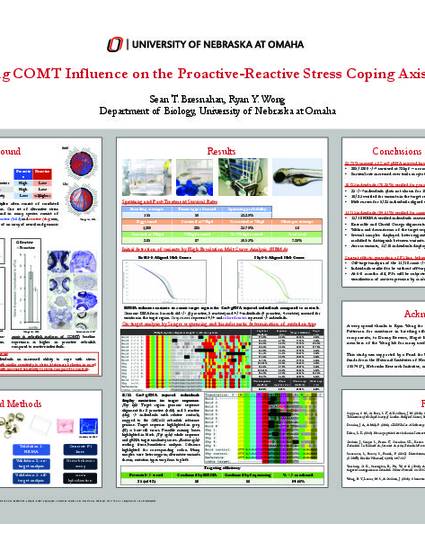
https://orcid.org/0000-0001-6685-1930
Individuals of the same species often display differences in correlated suites of behaviors which are made conspicuous when challenges – stressful, fear-inducing, etc. – are presented. In many species, a specific suite of behaviors (risk-aversion, aggression, exploration, learning, and memory) characterize an alternative set of stress coping styles (proactive and reactive). Such behaviors are regulated in the brain by specific neurotransmitters along with proteins that regulate them. One neurotransmitter regulator protein, catechol-O-methyltransferase (COMT) shows higher baseline whole-brain expression in proactive relative to reactive animals. However, it is not known whether its expression is a cause or a consequence of the stress coping style. In this ongoing study, I am testing the hypothesis that alteration of comta activity will lead to changes in stress coping behavior. Specifically, I attempted to knockout comtain zebrafish embryos using CRISPR/Cas9 with the intent of comparing stress-related behaviors and comtabrain-gene expression between mutant and control individuals in each stress coping style. I predict knocking out comtawill result in proactive zebrafish displaying similar stress-related behaviors as their reactive conspecifics and that reactive individuals will display elevated stress-related behaviors compared to controls. Across 155 breeding attempts, I found that approximately 23.75% (285/1200) of treatment embryos survived to 72 hours post-fertilization. High resolution melt analysis revealed 78.25% (18/23) to have variants in the target region, of which 11/18 (84.6%) showed successful mutations by Sanger sequencing. I intend to generate an F1 line in which to compare stress-related behaviors and comtabrain-gene expression by in situ hybridization.
Available at: http://works.bepress.com/ryan-wong/13/
